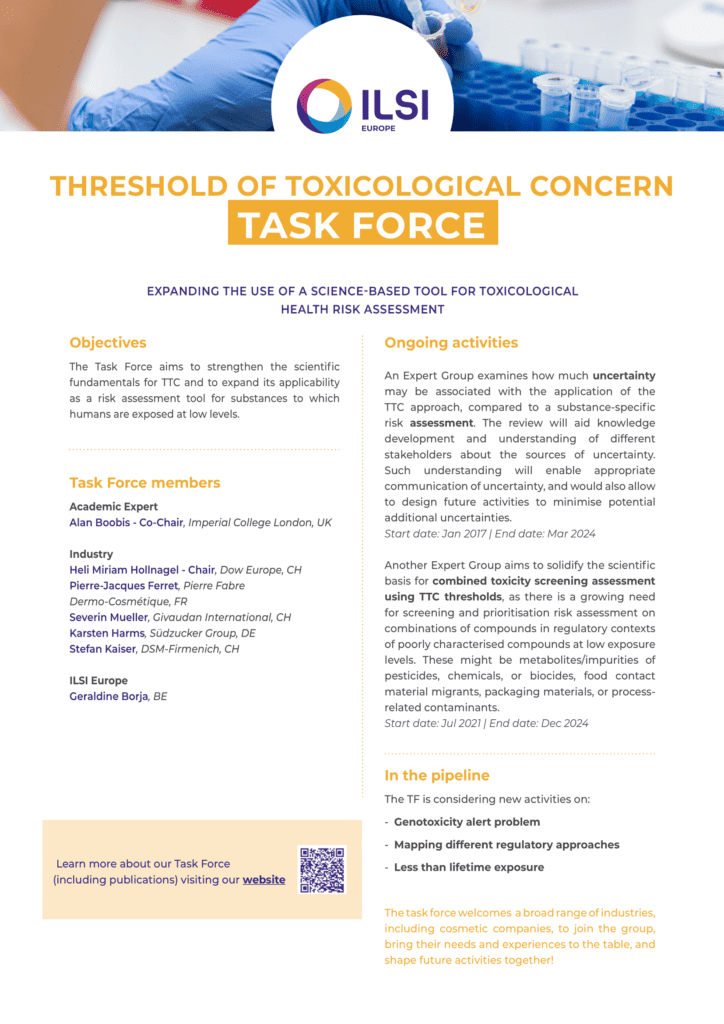Expanding the use of a science-based tool for toxicological health risk assessment objectives
Task Force Information
Objectives
The Task Force aims to strengthen the scientific fundamentals for TTC and to expand its applicability as a risk assessment tool for substances to which humans are exposed at low levels.
Task Force Members
| Heli Miriam Hollnagel – Chair | Dow Europe | Regulatory Toxicologist | CH |
| Alan Boobis – Co-Chair | Imperial College London | Emeritus Professor of Toxicology | UK |
| Pierre-Jacques Ferret | Pierre Fabre Dermo-Cosmétique | Director of Toxicology | FR |
| Severin Mueller | Givaudan International | Global Head Scientific Affairs | CH |
| Karsten Harms | Südzucker Group | Group Leader | DE |
| Stefan Kaiser | DSM-Firmenich | Principal Toxicologist | CH |
| Geraldine Borja | ILSI Europe | Scientific Project Manager | BE |
Contact Information
For more detailed information, please contact Geraldine Borja at gborja@ilsieurope.be
Activity Overview
Ongoing
- Uncertainty in Hazard Assessment: a Comparison of TTC versus Chemical-Specific Approaches
The review will aid to develop knowledge and understanding of different stakeholders about the sources of uncertainty and allow a conclusion if and if so, how much additional uncertainty may be associated with the application of the TTC approach as compared to substance-specific risk assessment. Such understanding will enable appropriate communication of uncertainty, and would also allow to design future activities to minimize potential additional uncertainties.
Start date: Jan 2017 | End date: Mar 2024
- Combined toxicity screening assessment using TTC thresholds
There is a growing need for screening and prioritisation risk assessment on combinations of compounds in regulatory contexts of poorly characterised compounds at low exposure levels. These might be metabolites/impurities of pesticides, chemicals, or biocides, food contact material migrants, packaging materials, or processrelated contaminants.
Start date: Jul 2021 | End date: Dec 2024
In the pipeline
- Genotoxicity alert problem
- Mapping different regulatory approaches
- Less than lifetime exposure
Expert Groups
Uncertainty in Hazard Assessment: a Comparison of TTC versus Chemical-Specific Approaches
Background and Objectives
The probabilistic approach using the genotoxicity and non-cancer (Cramer class) Thresholds of Toxicological Concern (TTC) is often perceived as accepting a higher risk than traditional risk assessments.
However, robust scientific activities to describe the sources of uncertainty within the TTC approach have not yet been conducted or published.
Output
The Expert Group examines how much uncertainty may be associated with the application of the TTC approach, compared to a substance-specific risk assessment. The group expects to produce two reviews: an initial focus on qualitative description and ranking of the identified sources of uncertainty. A subsequent quantitative assessment of the remaining quantifiable uncertainties.
Expert Group Members
Building cumulative assessment groups for combined exposure risk assessment based on TTC thresholds or read-across
Background and Objectives
Develop scientific approaches for refinement of TTC-based co-exposure risk assessments, using real-world case examples and focus on data-poor substances and poorly characterized compounds at low exposure levels (metabolites/impurities of pesticides, chemicals, or biocides, food contact material migrants, packaging materials, or process-related contaminants). Solidify the scientific basis for combined toxicity screening assessment using TTC threshold values
Output
Provide guidance on methods to predict specific toxicity or general toxicological similarity to enable grouping into cumulative assessment groups. Develop a workflow relevant for different regulations for coexposure risk assessment based on TTC thresholds, possibly combined with specific read-across groups. Evaluate if and in which cases it might be sufficient to compare the TTC thresholds to individual coexposure component levels and in which cases all or some coexposure components should be added.
Expert Group Members
| Alan Boobis – Vice-Chair | Imperial College London | Professor | UK |
| James Firman | Liverpool John Moores University | Researcher | UK |
| Heli Miriam Hollnagel | Dow Europe | Regulatory Toxicologist | CH |
| David Lovell | St George's University of London | Reader in Medical Statistics | UK |
| Angelo Moretto | Universita degli Studi di Padova | Professor of Occupational Medicine | IT |
| Grace Patlewicz | U.S. Environmental Protection Agency (EPA) | Computational Toxicologist | US |
| Cynthia Rider | National Institute of Environmental Health Sciences | Toxicologist | US |
| Florian Schmidt | Givaudan International | Toxicology and Product Safety Manager | CH |
| Szabina Stice | U.S. Food and Drug Administration (FDA) | Senior Toxicologist | US |
| Sanjeeva Wijeyesakere | The Dow Chemical Company | Computational Toxicologist | US |
| Geraldine Borja | ILSI Europe | Scientific Project Manager | BE |
Publications
All Publications
Thresholds of Toxicological Concern for Cosmetics-Related Substances: New Database, Thresholds, and Enrichment of Chemical Space
2017
Origin of the TTC Values for Compounds that are Genotoxic and/or Carcinogenic and an Approach for their Re-Evaluation
2017
Critical Reviews in Toxicology 2017. Commissioned by the Threshold of Toxicological Concern (TTC) Task Force.
Assessing the Safety of Cosmetic Chemicals: Consideration of a Flux Decision Tree to Predict Dermally Delivered Systemic Dose for Comparison with Oral TTC (Threshold of Toxicological Concern)
2016
Regulatory Toxicology and Pharmacology. 2016;76:174-186. Commissioned by the Threshold of Toxicological Task Force.
The Role of Hazard- and Risk-Based Approaches in Ensuring Food Safety
2015
Trends in Food Science & Technology. 2015;46(2) Part A:176-188. Supported by the following task forces: Emerging Microbiological Issues, Food Allergy, Food Intake Methodology, Novel Foods and Nanotechnology, Process Related Compounds and Natural Toxins, Risk Analysis in Food Microbiology, and Threshold of Toxicological Concern.
Evaluation of the Threshold of Toxicological Concern (TTC) – Challenges and Approaches
2013
Regulatory Toxicology and Pharmacology. 2013;65(1):168-177. Commissioned by the Threshold of Toxicological Concern Task Force.

